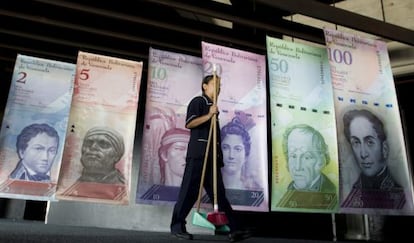Venezuela announces new free-market foreign exchange system
But Maduro government maintains convoluted multi-rate currency controls

Struggling to bolster state coffers as oil prices continue to tumble, Venezuela on Wednesday made available to the public a new foreign currency exchange structure based on market demands for the dollar.
The announcement was made Tuesday by Finance Minister Rodolfo Marco Torres, who explained that this third mechanism in Venezuela’s complex exchange rate system will allow legal trading of the dollar based on supply and demand.
In reality, the move represents no substantial change to the way Venezuelans are allowed to purchase dollars or euros, but rather a slight exception. Twelve years ago, the late President Hugo Chávez introduced strict currency controls, but now sections of the public and private sectors will be allowed to purchase dollars at floating market rates based on supply and demand through banks and brokerage firms via a new system called Simadi.
In reality, the move represents no substantial change to the way Venezuelans are allowed to purchase dollars
The official rate of 6.3 bolivars to the dollar for basic food imports, medicines and other necessary items needed for domestic production will remain. A second complementary rate of 12 bolivars to the dollar for other goods that are not considered priorities will also stay intact.
Venezuelan Central Bank (BCV) sources told EL PAÍS that under the new Simadi system the exchange rate could float between 125 to 140 bolivars to the dollar, which technically means that the government devalued the bolívar by 95 percent in relation to the official rate. Currently, the dollar is selling for about 187 bolivars on the black market.
The Maduro government is hoping more people will be attracted by the new system, but there are limitations. People will only be able to purchase up to $300 daily even though there will be no limit on the amount of dollars they can exchange for their bolivars.
People can purchase up to $300 daily but have no limit on the dollar amounts they can exchange
Opposition leader Henrique Capriles accused the government of trying to deceive the people. “They need to tell the truth to all Venezuelans: the government stuck another devaluation down their throats,” said Capriles, who is also the governor of Miranda state.
At first, the announcement of the changes to the system did not sit well with investors. Venezuelan bonds rose in price with yields dropping to one-month lows during Marco’s news conference, where it was expected that a more simple system would be introduced along with the confirmation of the devaluation of the currency. But bonds prices dropped again when the new three-tier system was explained.
BCV president Nelson Merentes, who was also at the news conference, predicted that the country’s cash flow would improve under the new system and the influx of dollars would not just be dependent on the struggling oil industry. He said the new exchange system would allow more companies to invest, and stimulate tourism and remittances abroad.
Many Venezuelans were hoping the government would also lift restrictions on the amount of dollars they can purchase for traveling abroad. Since last year, Venezuelans are allowed to exchange their bolivars for up to $3,000 (€2,635) if they travel to Europe – lesser amounts are allotted if they travel to neighboring countries. The money is provided through a government-issued credit card that can be used abroad.
Tu suscripción se está usando en otro dispositivo
¿Quieres añadir otro usuario a tu suscripción?
Si continúas leyendo en este dispositivo, no se podrá leer en el otro.
FlechaTu suscripción se está usando en otro dispositivo y solo puedes acceder a EL PAÍS desde un dispositivo a la vez.
Si quieres compartir tu cuenta, cambia tu suscripción a la modalidad Premium, así podrás añadir otro usuario. Cada uno accederá con su propia cuenta de email, lo que os permitirá personalizar vuestra experiencia en EL PAÍS.
¿Tienes una suscripción de empresa? Accede aquí para contratar más cuentas.
En el caso de no saber quién está usando tu cuenta, te recomendamos cambiar tu contraseña aquí.
Si decides continuar compartiendo tu cuenta, este mensaje se mostrará en tu dispositivo y en el de la otra persona que está usando tu cuenta de forma indefinida, afectando a tu experiencia de lectura. Puedes consultar aquí los términos y condiciones de la suscripción digital.








































